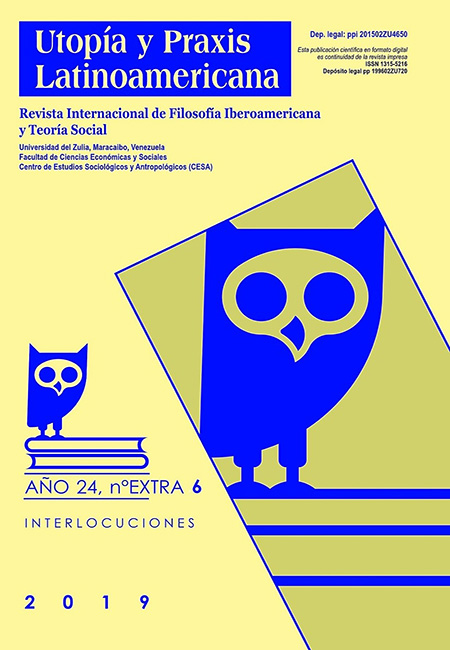Professional competency instrument validity of assessment on teacher work performance
Resumen
ABSTRACT
The purpose of this research is to examine professional competency instrument validity on the assessment of teacher work performance based on the analysis of Aiken's V and confirmatory factor analysis (CFA). The conclusions in this research, namely: 1) the results of testing the validity of Aiken's V content of 0.75 in the professional competence instrument, this indicates that the instrument can be used because it has been fulfilled substantially, construction, and language aspects; 2) the validity test result by confirmatory factor analysis shows that the 16 items on professional competency can be used to assess teacher work performance.
RESUMEN
El propósito de este estudio es examinar la validez del instrumento de competencia profesional en la evaluación del desempeño docente basada en la V de Aiken y el análisis factorial confirmatorio (CFA). Las conclusiones de este estudio, a saber: 1) los resultados de la prueba de validez de contenido V de Aiken de 0,75 en la competencia profesional del instrumento, indican que el instrumento puede usarse porque ha cumplido sustancialmente los aspectos de construcción y lenguaje; 2) El resultado de la prueba de validez mediante el análisis factorial confirmatorio muestra que los 16 ítems sobre competencia profesional pueden usarse para evaluar el desempeño del maestro.
Citas
BIBLIOGRAPHY
ALBALAW, AS (2017). “Mathematics Teachers’ Perception of Using Social Media in Their Teaching in Tabuk, Saudi Arabia”. International Electronic Journal of Mathematics Education, 12(2), pp.111-131.
ANDERSSON, C, JOHANSSON, P & WALDENSTRÖM, N (2011). “Do you want your child to have a certified teacher?”. Economics of Education Review, 30(1), pp.65-78.
ANGGARA, R & CHOTIMAH, U (2012). “Penerapan lesson study berbasis musyawarah guru mata pelajaran (mgmp) terhadap peningkatan kompetensi profesional guru pkn smp se-kabupaten ogan ilir”. In Jurnal Forum Sosial (Vol. 5, No. 01, pp. 107-203). Jurusan Pendidikan Ilmu Pengetahuan Sosial Fakultas Keguruan dan Ilmu Pendidikan Universitas Sriwijaya.
ARDAKAN, ARM, ALDIN, MM & TAFTIYAN, A (2018). “The impact of resistance economic policies on the reduction of cases that have been rejected and the tax gap in Businesses”. Uct Journal of Management and Accounting Studies, 6(03), pp.29-33.
ARITONANG, KT (2005). “Kompensasi kerja, disiplin kerja guru dan kinerja guru SMP kristen BPK Penabur Jakarta”. Jurnal Pendidikan Penabur, 4(4), pp.1-16.
BALLANTYNE, R, THOMPSON, R & TAYLOR, P (1998). “Principals’ conceptions of competent beginning teachers”. Asia-Pacific Journal of Teacher Education, 26(1), pp.51-64.
EDEME, RK (2018). “Revisiting the economic growth-welfare linkages: Empirical evidence from Nigeria”. Asian Themes in Social Sciences Research, 1(1), pp.28-33.
EDSON, M, TAKESURE, H, ISAAC, CT & SIMON, N (2017). ? Extra Lessons or Extra Cash?: A Case Study of Schools in Masvingo Urban, Zimbabwe, from a Social Sciences? Perspective. International Journal of Asian Social Science, 7(4), 340-358.
EKETU, CA (2018). “Perspectives on Human Nature and Implications for Research in the Behavioural Sciences”. International Journal of Emerging Trends in Social Sciences, 4(1), pp.42-46.
GANYI, MF (2016). “The Liberating Potential of Oral Literature in a Globalized Context”. International Journal of Publications and Social Studies, 1, pp.16-30.
HULING, L & RESTA, V (2001). “Teacher Mentoring as Professional Development”. ERIC Digest.
JOHNSON, RL, PENNY, JA & GORDON, B (2008). “Assessing performance: Designing, scoring, and validating performance tasks”. Guilford Press.
KOPACKOVA, H & LIBALOVA, P (2019). “Quality of Citizen Reporting Tools at Municipal Level”. Journal of Information Systems Engineering & Management, 4(3), pp.1-12.
LONG, JF & HOY, AW (2006). “Interested instructors: A composite portrait of individual differences and effectiveness”. Teaching and Teacher Education, 22(3), pp.303-314.
RAMADANI, M, SUPAHAR, S & ROSANA, D (2017). “Validity of evaluation instrument on the implementation of performance assessment to measure science process skills”. Jurnal Inovasi Pendidikan IPA, 3(2), pp.180-188.
RETNAWATI, H (2016). Validitas reliabilitas dan karakteristik butir. Yogyakarta: Parama Publishing.
TIMPERLEY, H, WILSON, A, BARRAR, H & FUNG, I (2008). Teacher professional learning and development.
ULLMAN, JB & BENTLER, PM (2003). “Structural equation modeling”. Handbook of psychology, pp.607-634.
WILKERSON, JR & LANG, WS (2007). “Assessing teacher dispositions: Five standards-based steps to valid measurement using the DAATS model”. Corwin Press.









